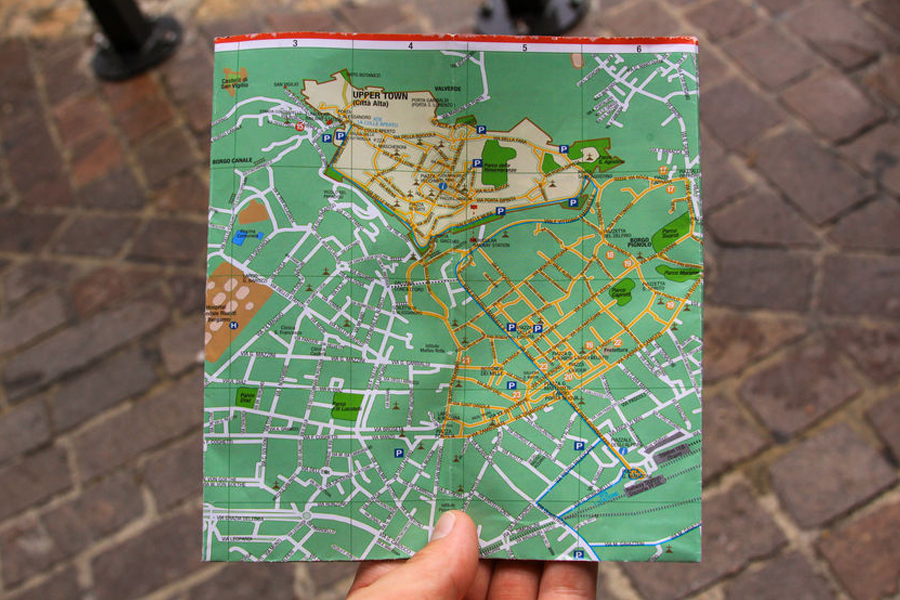By Linda Wisniewski
Imagine your feet in damp socks inside your sneakers. You jump over puddles on a busy Italian street. Rain drips off your glasses as you try to read the map your cruise line provided, searching for Mercato Centrale di Livorno—the Livorno Central Market. You’re nervous, but you think of your grandparents arriving in the U.S. 100 years ago. If they could navigate the streets of a foreign country, so can you. Your husband insists he knows the way, but you are skeptical. You just want to get inside, get warm, dry your feet.
It’s the first morning of your 30th-anniversary Mediterranean cruise, and you have arrived at your first stop. You duck into an information center, where a nice woman behind the counter shows you the way to the market.
“Go outside,” she says. “Turn left and there it will be.”
But the streets spread out like crooked wheel spokes. Which left? Your husband says he knows. You follow him and spy a brightly lit shop with an artful display of knit hats. You try on a soft purple one. Only six euros. In the mirror, you look stylish.
You walk on, your head dry and warm, but still no mercato. A pastry shop beckons. Don’t they always? You pull open the glass door and step inside. The man behind the counter shrugs when you ask directions. Frustration grips your forehead.

Imagine a male voice behind you. “Where do you want to go?” he asks. You show him on your map. “Why do you want to go there? It’s nothing to see.” He is dark-haired and handsome. A short pretty brunette at his side smiles at you.
You remember the next item on your list. Perhaps the Modigliani Museum?
“Ah, it is beautiful,” he says, then waves at the rain outside. “Mamma mia!” He starts to give directions but the brunette interrupts. Clueless, you watch their hands wave left, right, up in the air, until laughing, they turn back to you.
“Come, I will take you there,” he says. “My car is just outside.” You and your husband exchange a glance, imagining the headline: “American Tourists Kidnapped in Italy.”
The man sees your silent exchange. “You can trust me,” he says. “I’m a lawyer.” Everybody laughs and you follow the couple outside to his car, which is indeed parked at the curb. He points at a child-safety seat in the back. “Per i bambini!”
His wife motions you into the back seat with her while your husband climbs in front. “It’s not far,” the Italian man says, putting the tiny car in gear. “Livorno is a very important port in the history of Italy….” His wife rolls her eyes and giggles. She points at your chest.
“Il nave?”
Sorry, you say, you don’t understand.
“Boat?” she asks, pointing toward the harbor.
“Si, si!” You both say “Il nave!” You laugh together.

Imagine you are off the boat in more ways than one. Your grandparents left Europe a century ago from a harbor farther north, bound for a better life in New York.
Yesterday, you flew from New York to Rome in a third of a day, then stepped aboard a luxury liner for a vacation on a ship. Your grandparents’ ocean journey took weeks; they were probably seasick and traveled in steerage. There were no waiters, no violins at dinner. Nobody gave them a map.
But they gave you this: a life in which you sail into a European harbor. Like them, when you arrive at your destination, you seek help from people who barely understand you.

The young lawyer is right. The ride to the museum is short. He drops you off at the entrance and wishes you a nice day. “Grazie,”you say, and you part from the man and his wife using the universal language of nods and smiles.
Inside the museum, you view the work of an artist born in Livorno who lived only 35 years. “Modigliani knew how to soak up influences from everyone,” the curator wrote. “As a sea-faring man, someone who lived in a city with a harbour, …he understood that you can’t live there without encountering people coming into the port from elsewhere….”

That night, you hang your socks to dry in your cruise ship cabin’s tiny bathroom. You imagine the smiling young couple you met today at their home, telling their bambini about the Americans they met in the bakery.
About the Writer:
Linda C. Wisniewski lives in Bucks County, PA where she volunteers at the historic home of author Pearl S. Buck. Her memoir, Off Kilter, was published in 2008 by Pearlsong Press. Linda’ debut novel, Where the Stork Flies, is forthcoming from Sand Hill Review Press. She blogs about life and connections at www.lindawis.com.
